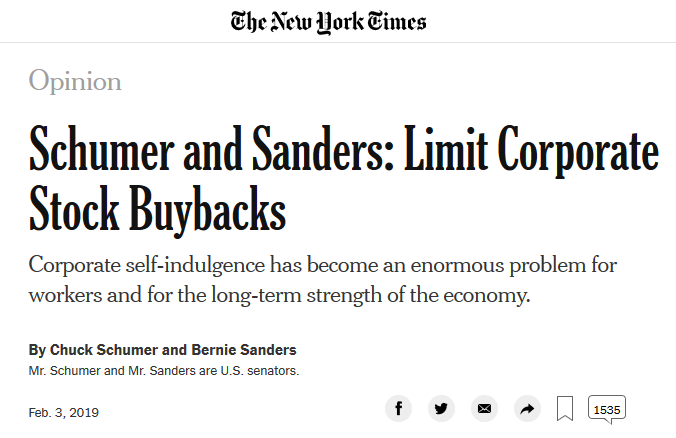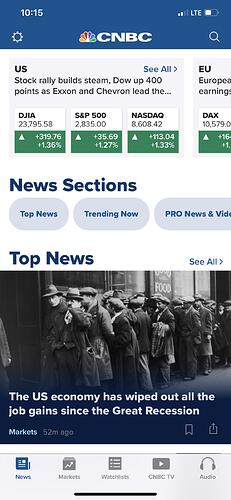eh
Yeah, that’s stupid. Far better would be meaningful equity for the government in exchange for being a lender of last resort, similar to a prepackaged bankruptcy. Not wiping out existing equity, or at least requiring a huge haircut, is insane.
Some (many?) stock buybacks in recent years were actually debt financed which seriously undermines the idea that they are just a more efficient version of a dividend. Theoretically you’re not wrong, but in reality there a lot to dislike about stock buyback practices. There seems to be a pattern in American corporate culture where instead of actively working to improve a company’s productive capacity companies instead lean toward financial tricks that promise something for nothing.
There’s a benefit to regular dividend payouts, in that shareholders can anticipate and plan their personal financies around them. But that benefit isn’t there for buybacks - as a shareholder I’m not personally affected by the corporation buying back shares. I can choose to hold or sell my own shares, but that choice is there every single day regardless of whether the corporation is buying back firms on that particular day.
You could make a hand-wavy argument that managers are turrible at valuing their own stock (probably true), so if they force themselves to buy back shares at regular intervals they’ll effectively prevent themselves at only buying stock when it’s overvalued.
But I think the benefit to buybacks is that they are intentionally not regular, and that they should be done at a time and at a level that’s appropriate to the firm’s stock price and capital needs. When the firm is awash in cash and has no investment opportunities, great. Load up on buybacks. When the firm has a bunch of available investments, great, use all the cash on those investments.
Dividends should ideally be the same way - managers should be able to increase or decrease dividends in accordance with their capital needs and opportunities. But for some reason, we’ve developed an equilibrium where dividend stability is an inherently desirable attribute, and a firm cuting back on dividends is sending a giant red flag about their financial strength.
Yeah, this is what drives me crazy. Like this editorial:

If you want to propose legislation because you think firms should pay higher wages to their employees, ok. Regulate employee compensation. If you want to propose legislation because you want to increase the financial stability of firms, ok. Regulate capital structures, like the Fed does with banks. But don’t put limits on buybacks, ignore dividends, and then claim that you’re really interested in employee compensation and capital structure.
Not sure what this means, unless you’re just talking about taxing capital gains and dividends at the same right. If so, sure.
I don’t see a problem with a firm buying back stock or issuing dividends when they happen to owe debt. You can label it “deft-financed” dividends or buybacks, but I don’t think there’s anything wrong with a firm effectively levering itself up as long as that firm doesn’t pose some systemic risk to the economy or is likely to get bailed out in some way when things go south. [Narrator: …]
I think the greater tendency is for managers to build empires and engage in acquisitions in an effort to get higher compensation and greater social status, even when those acquisitions and growth are terrible investments. On balance, firms should be returning more money to shareholders than they currently are.
Well, yeah. This is the argument for more regulation before a catastrophe and less bailing out after.
Sure, but there’s no effective difference between dividends and repurchases in this context. Cash is gone, company is riskier either way. Yet it’s the repurchasers and not the dividend payers that get all the scorn.
I just want to emphasize something because it may have been lost in the discussion - some companies had been issuing new debt to finance buybacks. So they’re not using free cash flow, they’re leveraging to do the buybacks. That’s the kind of thing I think should be up for debate re: regulations.
I’m not sure why debt-funded buybacks are substantively different from debt-funded R&D spending or advertising. (I’m not even sure how you’d define a debt-funded buyback - any situation where a firm buys back shares and increases debt in the same period?) If you want firms to maintain a minimum capital buffer, then regulate that directly imo. If a lender is dumb enough to lend money to a risky firm and not place any restrictions on shareholder payouts, it’s hard for me to be very sympathetic.
I kind of agree with you, but I can also see some additional nuance. Borrowing to fund R&D or advertising is funding legitimate and essential business functions. Borrowing to buyback shares is a pure financial play and it’s all driven by tax arbitrage and stuff like that. What I’m saying is that I am sympathetic to regulating companies so that they spend their time delivering goods and services, not dicking around with their balance sheet. When Finance drives the bus they have this annoying habit of driving it right off a leverage cliff. I can see a broader social benefit to steering companies toward helping customers instead of over engineering next quarters NOI.
I know this is mostly the stocks thread, but my personal finance situation got an update today.
The travel company that hired me and then put the position on indefinite hold has updated my position to terminated as of today. So I am back to officially unemployed withoutever starting that job.
Sucks man, sorry to hear that. My company told a lot of people that we had offered jobs to that we will try to bring them in Jan 2021. Not surprised that other companies are just saying to forget it.
Sorry to hear that man 
I appreciate it. In all honesty I’m not sure how well they will bounce back after this whole thing anyway so may be a blessing in disguise. Was just really bad timing this whole thing.
That really sucks, sorry. Any chance at getting the old job back?
Nah, they had to let people go to so I was likely on the way out there since I was new kid on the block
After much thought I have a plan: get out (of stocks, into cash, mostly euros) if the Dow gets above 28k OR we get to re-opening and the first sign things are getting ugly and we may need to shut down again (which I think will probably happen, but I think the current euphoria wave could ride until then).
I just don’t see much upside at all when the dow gets within spiting distance of its previous highs. And of course the potential for a huge drop is omnipresent. Getting out when things start to turn south after the first “open up” will be easy. But getting out at 28k might be hard. Need to not be greedy.
Complication is I just realized I’d have to pay short term capital gains in my brokerage account if I pull out anytime soon. So I guess I’m kind of ride or die in that with MSFT, DGX, AMZN and BRK.B. However if they fall back to where I bought them a month ago or so then I guess I can safely eject w/o capital gains. But by that point I’m not sure it’s worth it.
However in the IRAs which are like 80% of my stonks money - I can apparently do whatever I want (please correct me if I have this wrong). So counter-intuitively I have more of a hair-trigger on the money I don’t plan to withdraw for at least 9 years.
Further complication is how much higher can AMZN really go? This is silly. Also DGX seems to have a cap at 115 and MSFT does’t have much higher to go to hit its all time high. So I need to wind those down. But again I can’t do so in my brokerage account, which I may need soon, or I get hit with a massive govt rake.
I thought rich people got all the breaks? How have they not killed capital gains taxes yet? When my stepdad left me 28k I was blown away I got to keep all of it with no tax. Then I was like - ohhh I’m riding on rich people’s coattails.
The only question is what the value is of the market when pricing in all the bailouts - it may be more than Dow 29.5K. That’s giving me pause to sell off almost everything at Dow 25K.
I know for sure I’m not smart enough to know what the market is really worth. I have read and heard very convincing people who think the dow is really worth like 5k, and we live in a multi-generation ponzi scheme. I actually think they could be right. I just hope I get out before the music stops.
Sucks man.
My firm hired 1 when CV really started cooking, and we’re talking about maybe bringing on 2 more.
The firm actually grew during the 2008 recession, so I trust they know what they’re doing.
